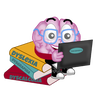Finding hope for a better future despite the persistent challenges of Dyslexia.Studies show that there is no single pattern of difficulty for Dyslexic people. For some, the struggles may come in the form of having trouble reading simple words, even if they have encountered these words many times. Others read slowly and often feel they have to work extra hard when reading. While some Dyslexic people mix up the letters in a word, such as reading the word "now" as "won" or "left" as "felt." For people with Dyslexia, words blend together and spaces are often lost. Aside from reading, Dyslexic people also have trouble remembering words and sentences they've read. One way to help Dyslexic students that are auditory learners remember information being taught is for them to read the words out loud or have it read to them or record the material and listen to, which explains why audiobooks are a fantastic tool. For our visual learners, they may prefer to read along while listening to the audio book, so they can focus on the words they are hearing. You will discover Dyslexic people have a keen ability to come up with solutions that make learning easier. Some Dyslexic people also struggle with math. Word problems in math may be especially hard, even if they've mastered the basics of arithmetic. This is because most of the math terms are above reading level, or have irregular spellings. There are also cases where word problems can lack context or have complex grammar depending on the grade level that the student is not able to comprehend because it is above their reading level. A large number of Dyslexic students, for example, might have a hard time remembering which process they are supposed to use for a given problem, they often struggle to switch from addition to subtraction problems, or multiplication and division. One thing that is common among all Dyslexic people is how difficult spelling is. People with Dyslexia struggle immensely with spelling because spelling involves reproducing a word shearly from memory, as compared to reading which is recognizing a word. There are also many possible spelling options for words which can make it more challenging to remember which way to spell the word in this situation. While Dyslexia cannot be cured, there are early interventions that can help a child learn how to overcome these struggles. According to a 2013 study by Margaret J. Snowling, Dyslexic students not given the proper interventions as early as possible are unlikely to ever become proficient readers, which has significant long-term implications. Moreover, Dyslexic students are more prone to depression and anxiety due to the shame and stigma around not knowing how to read, spell, write or do math. The Good News It’s not too late to give your learner the right help. For students with Dyslexia or other similar learning differences, it is very important to use an individualized approach for their specific and unique needs through multi-sensory techniques. We provide this to our students with learning challenges in our private online tutoring program, which offers personalized attention and the opportunity to address specific learning needs, which is highly effective for students with Dyslexia. Moreover, students can rediscover their strengths and other amazing abilities because their confidence is constantly being boosted by our tutors. Additional Resources:
Schedule a FREE consult now at 3DLearningExperts.com/consult and find out how our services can give you and your child a brighter future.
0 Comments
Your comment will be posted after it is approved.
Leave a Reply. |
LEXIA LEARNERS LOUNGE
AuthorJess Arce is a homeschool mom of four, a tutor for children & adults who struggle with Dyslexia & Dysgraphia and an all around entrepreneur. She is passionate about helping others understand dyslexia. |
